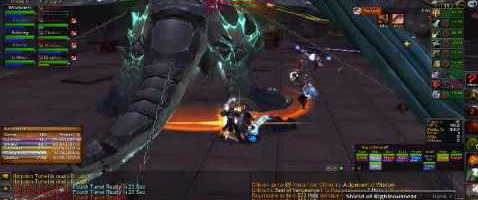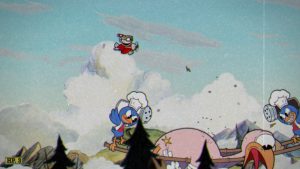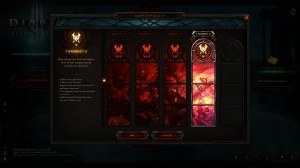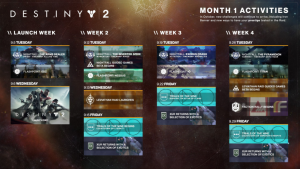Trending
Opinion: How will Project 2025 impact game developers?
The Heritage Foundation's manifesto for the possible next administration could do great harm to many, including large portions of the game development community.

Featured Blog | This community-written post highlights the best of what the game industry has to offer. Read more like it on the Game Developer Blogs or learn how to Submit Your Own Blog Post
Grinding in video games is something to be avoided, and in today's post, we're going to talk about the ways designers can implicitly and explicitly reduce it.

"Grinding" in video games has gotten a lot of buzz lately with the push towards loot box and gacha design. When it comes down to it, the player should never feel like the game has become a grind; even if they are replaying levels or content. For today's post, we're going to look at two very different areas of focus that allow designers to mitigate the feel of grinding.

World of Warcraft
Grinding in video games can mean different things depending on the game and player in question. For me, I use the following definition --
Grinding: When the player has no other option than to repeatedly perform a task in order to progress in a game. Any other forms of gameplay will not contribute to progression.
For many video games, grinding is simply playing the video game, but without the feel of progression. RPG-based games are the most popular examples of grinding. The reason is that abstraction-based design makes it very easy to inflate the time spent playing by raising enemy stat values.
We could also approach things from "skill grinding," where a game requires the player to repeat a section until they know the exact solution. You can see this in games like Super Meat Boy, 1001 Spikes or Cuphead.

Cuphead
Skill grinding is a different topic, and has its own philosophy and designIt's never a good sign when a game feels like a grind to the player. Once they lose that sense of progression, it's very difficult to get it back.
Because of that, designers these days will do their best to prevent the feeling of grinding from happening.
To implicitly fight grinding comes down to understanding how your game works. Even if we're talking about games with random encounters/situations, you should have a rough idea of how often the player is earning experience. From there, it's simply a matter of adjusting experience values or enemy attributes to keep the player always moving towards new content. If you do it right, the player should always be strong enough to complete a section of the game without needing to repeat it.
For MMOs, or games with quests, try to have it so that the player is always earning enough experience via questing to keep going. You can do this by either having more quests, or adjusting the experience give-out from what's there.
Another option in RPG-based games is to use scaling, or adjusting enemy values based on the character's level. One of the best examples of this was in Diablo 3 post balance patch. The advantage of scaling is that it takes the guesswork out of knowing how strong the player is.

Diablo 3
Scaling is an example of an implicit way of reducing grindingThe problem with scaling is that it can make the game feel artificial and sometimes punish players who didn't properly build their character.
In Oblivion, the game only took the player's level into account when scaling enemies; not what there combat skills were. This created a situation where characters were fighting enemies at their main level, but way above what their combat ability was.
For skill-based designs, it's a lot harder to combat grinding. The reason is that every player is different: One player's wall is another player's easy time. This part goes more into level and tutorial design which is beyond the scope of our post.
Our next category is when developers make the options to avoid grinding very clear to the player.
Explicitly combating grinding is all about designing multiple forms of progression. If the player can't go forward with X, then they can do Y and see progress. The simplest example would be the act of finding new gear in a RPG. Finding rare gear can easily retain its value for more levels compared to lesser gear.
For RPGs, especially MMOs, the problem comes in at the level cap. Once the player reaches the end, leveling progression comes to an end and is not replaced. From there, the only option is to get lucky with item drops to find replacements for your gear.
What we can do to mitigate grinding is to present other ways to go about progressing. Here are a few examples of systems to get around loot drops:
Milling items you don't want to get resources to just buy an upgrade
Upgrading an item to a higher tier or rarity
A "Gambling" vendor who has a chance at dropping any item
In these situations, the player has several ways of continuing progress. More importantly, these options can tie into each other to allow progress in one to go towards the rest. In Diablo 3, by going into rifts, the player has a greater chance of getting legendary items. At the same time, they can earn blood shards that are used at the gambler. For games that go this route, these options are not made available until the player reaches the level cap.
If the player is going to have to repeat the base content, then allow them to quickly get what they need to keep progressing. The problem I had with DC Universe Online was that the second I hit the level cap, I was prevented from accessing new content. The only way to go forward was to repeat missions I already did for currency in order to buy the tier one raid gear.
The better option would have been to make the gear possible to drop at that point, and use the vendors as a plan B. When the player is working towards something, they'll feel like their making progress.
As "Games as a Service" has grown, we are seeing one other option to fight grinding.
Games that are meant to be consistently played need to keep the player engaged to come back. The problem is that someone who does nothing but play one game day-in and out will get burnt out.
An alternative we have seen is having progression focused on a specific daily act. This could be a bonus mission or limited-time event designed to motivate the player to play. Completing these actions will always reward the player more than just playing the game normally.
More importantly, these events are limited to once a day; preventing them from being exploited. By rotating and adding in new events, it allows the player to focus their play for a limited-time, and then come back for another event.

Destiny 2 (Daily Radar)
Daily activities focus the player's attention while rewarding themTo me, this feels like the logical next step from implementing "rest exp" in MMOs, as a way to reward the player for not playing the game all day long.
Grinding in its purest form should never be rewarded or celebrated by the game. A good designer should understand the progression model of their game and do their best to make the experience as streamlined as possible.
With the recent push towards loot box design, I feel that this is an important point to make. Grinding is not an example of good design; nor should your game be designed to exemplify it. Making your game grind-centric is not going to keep people playing, but annoy them enough to get them to quit.
Read more about:
Featured BlogsYou May Also Like